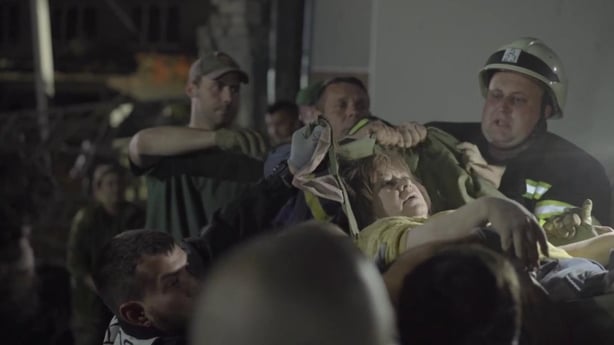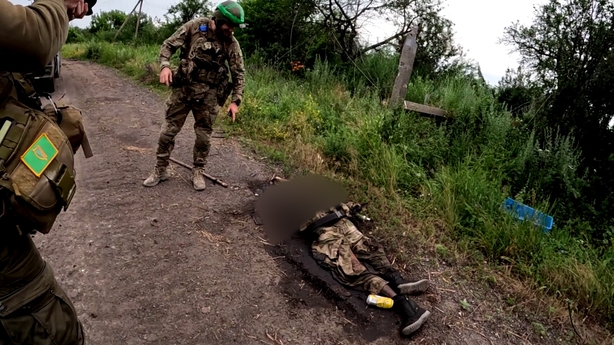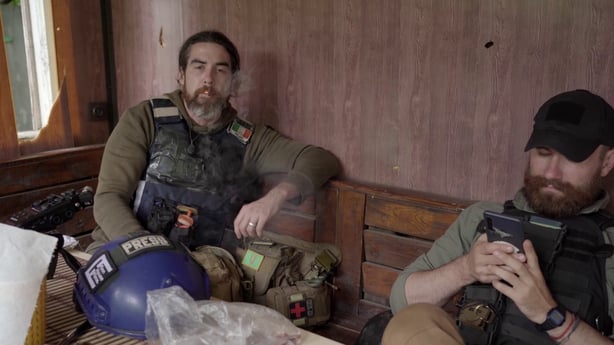An Irish filmmaker who has spent close to seven months documenting the war in Ukraine has spoken about a near-death experience and witnessing scenes "we haven't seen since World War II" on the frontlines.
Bray native Finn Boylan has been travelling to the frontlines of the war in eastern Ukraine since the full-scale Russian invasion was launched in February 2022.
Some of his footage will air exclusively on Prime Time at 9.35pm on RTÉ One.
Mr Boylan spoke to Prime Time on his return to Ireland a little more than two weeks ago.
"It does take time to readjust. A couple of days ago I was having explosions going off all around me. It’s total war," he told Prime Time.
On his most recent trip he was based in the city of Kramatorsk, travelling back and forth from there to the frontline.
"Unfortunately, everything is a target in that town. You don’t know when the next missile is going to hit you."
At least 13 were killed and dozens more injured. As a large crowd gathered in the aftermath, Mr Boylan was one of the first on the scene and captured the moment a survivor was pulled from the rubble.

Despite the deaths and international condemnation of the attack, he says locals remain determined to maintain some sense of normality.
"The next morning everyone is going into the shopping centre next door. Going to work. Selling groceries. Getting their coffees. Now soldiers need to find a new place to drink their coffee, so there's another one down the road. It’s just how it is. Life goes on there."
Boylan also spent time filming at a medical stabilisation point where wounded soldiers are given treatment just behind the frontline before being moved on to hospital.
"In the space of one night at that stabilisation point, there were five dead. Two dead on arrival, three dead on the table. About ten lost their legs that night."
"[It] is where wounded soldiers get their first bit of proper medical care where they'll see a doctor or somebody that will patch them up enough and stabilise them to make them able to survive the journey to a real hospital.
"They can only move the wounded in the night because it's too dangerous at the moment," Mr Boylan said.
On a visit to another town liberated from Russian forces at the southern front, Mr Boylan was brought on a tour by Ukrainian soldiers who walked him through what had happened during a counter-offensive which had ended two weeks previously.
In his footage, dead Russian soldiers are seen abandoned on the side of a dirt road.

"Unfortunately, the Russians are left on the battlefield. No one's picking them up. The Ukrainians collect their own dead and their own civilians. It's brutal," Mr Boylan said.
"They hate each other and it's very easy to understand why... If someone came to your hometown and bombed the hell out of half your family, uprooted your whole existence, slaughtered your neighbours..."
"It’s very easy to sit from a position of comfort and say: 'that’s horrible, I would never do that.’"
Mr Boylan says when resting, soldiers often watch speeches by President Zelensky on their phones, or check updates to find out about war developments in other parts of the country.
"You only live in your little bubble out there. You have no idea what's going on in the rest of the front. Any downtime you get where you do get internet access, you generally try and find out what’s going on along the rest of the front or message your mates to see if they’re still breathing."
Smoking is permitted on the front, but the only beer you are ever likely to see is a non-alcoholic one.
"Alcohol is completely forbidden in frontline areas. You can be court martialed as a soldier, thrown in prison and arrested by the police. The big one is cigarettes. Just packs and packs and packs and packs of cigarettes. It de-stresses you."

Having returned to Ireland he feels lucky to be alive. His closest brush with death came in May 2022, when he was part of a group looking through an abandoned school, when they were targeted by a Russian drone.
"We went into a recently liberated village. I was in the building no more than five minutes when the first shell started coming in. About two or three minutes later another one came and hit the building," the 31-year-old said.
"At that moment we knew they were readjusting fire and we were the target and then we just made a break for it out of the building," Mr Boylan said.
In the footage, Mr Boylan runs from the school to his car nearby while mortar fire rains down.
"The alarm in my car started going on and off outside. That was the closest I came to getting killed."
Mr Boylan has worked with a Ukrainian colleague or 'fixer' to gain access to the frontline and is hoping to eventually produce a feature-length documentary using the footage collected.
"My camera is my shield. I filter everything through my lens. I always have that disconnect."
He is getting married soon and says that while readjusting to life in Ireland can be difficult when he returns from his trips, he’s happy to be able to spend time with his family and his dog.
"I count my blessings every day. We're incredibly lucky here. We really don't appreciate it. We complain about the small things that aren't problems at all. " Mr Boylan said.
"This could go on for many years to come. It's going to be a lot more casualties and a lot more young men dead."
Watch Philip Gallagher’s piece on Finn Boylan’s frontline experiences on Prime Time at 9.35 on RTÉ One.





